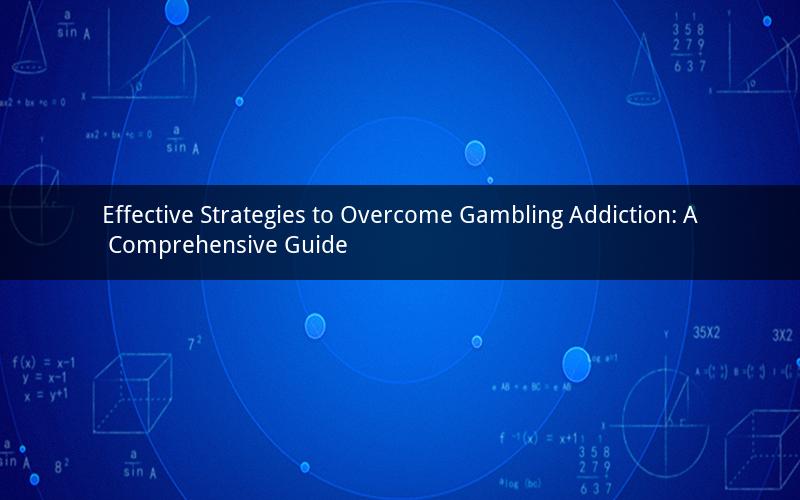
Gambling addiction, also known as gambling disorder, is a significant issue that affects millions of individuals worldwide. It is characterized by an uncontrollable urge to gamble, despite the negative consequences. This article aims to provide you with a comprehensive guide on how to not get addicted to gambling, offering various strategies and insights to help you maintain a healthy and balanced life.
1. Understand the Risks and Consequences of Gambling
To begin with, it is crucial to be aware of the risks and consequences associated with gambling addiction. This includes financial loss, strained relationships, and potential legal problems. By understanding the gravity of the issue, you can take proactive measures to prevent yourself from developing an addiction.
2. Establish Clear Limits and Budget
Setting clear limits and budgeting are essential steps in avoiding gambling addiction. Decide on a specific amount of money you can afford to lose and stick to it. Avoid chasing losses by increasing your bets or spending more than you planned. Remember, gambling should be a form of entertainment, not a means to make money.
3. Develop a Support System
Surrounding yourself with supportive individuals can significantly reduce the risk of developing a gambling addiction. Seek the help of friends, family, or colleagues who can provide encouragement and hold you accountable. Consider joining a support group for gamblers or seeking professional help from a therapist specializing in gambling addiction.
4. Diversify Your Hobbies and Interests
Finding alternative activities to gambling can help fill the void and reduce the temptation to engage in risky behavior. Explore new hobbies, exercise regularly, and participate in social events. By diversifying your interests, you can create a fulfilling life that does not rely on gambling as a source of entertainment.
5. Practice Self-Reflection and Mindfulness
Self-reflection and mindfulness can help you gain control over your gambling habits. Spend time in quiet contemplation, analyzing your thoughts and emotions. By becoming more aware of your triggers and desires, you can make conscious decisions to avoid falling into the trap of addiction.
6. Seek Professional Help
If you find it challenging to overcome your gambling addiction on your own, seeking professional help is crucial. A therapist or counselor can provide personalized strategies and support tailored to your specific needs. Therapy may include cognitive-behavioral therapy, which helps you develop healthier thought patterns and coping mechanisms.
7. Avoid Problematic Gambling Environments
Steer clear of environments that may trigger your gambling addiction. This includes avoiding casinos, racetracks, or online gambling platforms. By limiting your exposure to these settings, you can reduce the temptation to engage in risky behavior.
8. Stay Informed and Educated
Stay informed about the risks and consequences of gambling addiction. Educate yourself on responsible gambling practices and be aware of the warning signs of addiction. By staying informed, you can take proactive steps to prevent yourself from falling into the trap of addiction.
9. Develop Healthy Coping Mechanisms
Identify and develop healthy coping mechanisms to deal with stress, anxiety, or boredom. Instead of turning to gambling as a form of escapism, find healthier ways to manage these emotions. This may include practicing relaxation techniques, engaging in creative activities, or seeking support from friends and family.
10. Stay Committed to Change
Overcoming a gambling addiction is a challenging process that requires dedication and commitment. Stay focused on your goals and remind yourself of the positive changes you are making. Celebrate your successes and be patient with yourself during setbacks.
Questions and Answers:
1. How can I identify if I am developing a gambling addiction?
Answer: Look for signs such as preoccupation with gambling, feeling the need to bet more money to achieve the same thrill, lying to hide gambling activities, and experiencing negative consequences due to gambling.
2. Can I overcome a gambling addiction on my own?
Answer: While it is possible to overcome a gambling addiction on your own, seeking professional help from a therapist or counselor can significantly improve your chances of success.
3. Are there any medications that can help treat gambling addiction?
Answer: Currently, there are no medications specifically designed to treat gambling addiction. However, therapy and counseling can provide effective treatment options.
4. How can I break the cycle of chasing losses?
Answer: Set clear limits and budgets, avoid chasing losses by increasing bets, and seek support from friends, family, or professionals who can help you develop healthier habits.
5. What can I do if I have a friend who is struggling with a gambling addiction?
Answer: Offer your support and encouragement, suggest they seek professional help, and be patient with them during their journey to recovery. Remember, you cannot force someone to change, but you can provide a supportive environment for them to do so.